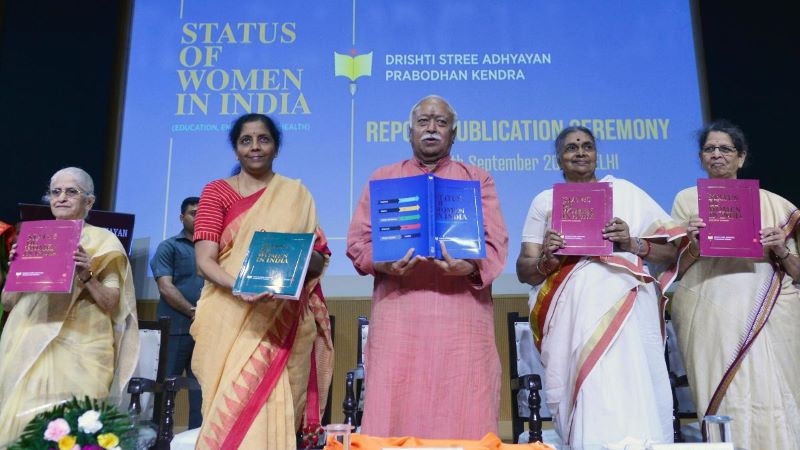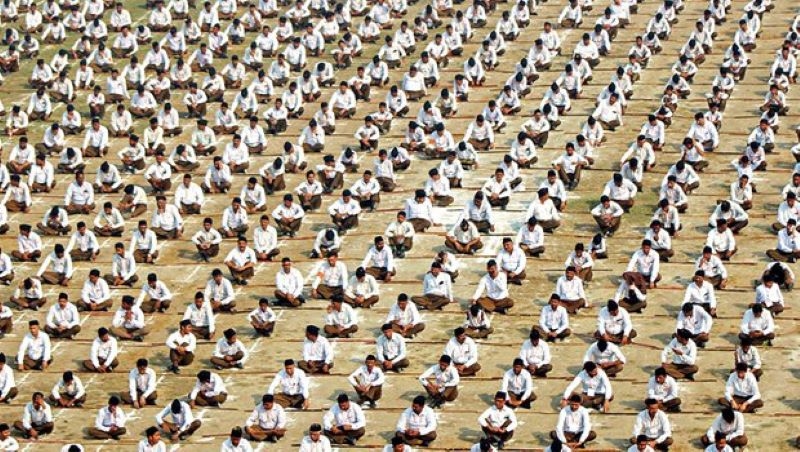Opening the RSS to the World- VI: Network of networks

The Sangh is a network of networks. A large number of front organizations can be created with Sangh’s inspiration. There is no rigid list. Due to this nature Parivar organizations refer to as ‘Sangh’s Shrishti’. The ‘Sangh’s Mantra’ is the synergy of constructive energies in the national interest. There will be no duality between Sangh and society. Thus, new India will be developed strong and rooted in its life values. It will be the welfare force for the entire world.
‘Communicate, Connect, and Collaborate’ is encompassing patron of two ways technological advancement of the world. The advent of the World Wide Web (WWW) has brought the global village phenomena within the reach of common people. The Hindu thinking of world affairs is not governed by politics and diplomacy only.
Global welfare, constructive attitude, co-operative relations, and familial etiquette are the main idea on which India’s relation with the world is conceived. Hindu cultural relations are an important binding factor for southeast Asia, South Asia, East Asia, and also many other parts of the world. The Sangh neither views international relations as politics among nations nor in terms of hegemony formula. The relations of India with members of the world community are always going to resemble the relations between individuals in the spirit of ‘Vasudhaiva Kutumbakam’.
The Sangh believes that every country should develop economically and politically, but not at the cost of other countries. The relation should not base on fear. The term ‘Pravasi’ gained currency for the ‘Pokharan II’ nuclear test. The pravasi communities have deep cultural bonds with India.
The Sangh has an attitude of reverence for the pravasis. Inspired by RSS many Hindus are living in different parts of the world have created Hindu organizations. ‘Seva International’ is another reputed Sangh inspired body working in the field of international relations. Islamic Terrorism is threatening the entire world.
Grounded in Hindu thought, the Sangh considers all faith as equally true and respects all roads to the divine. It is shocking that throughout the world, there is a deliberate move to wipe out indigenous cultures. In contrast, the author points out that in India even the oldest tradition is alive and vibrant. The maxim of ‘Live and Let Live’, ‘Unity in Diversity’, ‘The World is One Family’, and ‘Let us enable the World’ have major relevance. Today happiness and wellbeing of everyone are always sought by India.
The Sangh believes that fundamentalism and rigidity shut us to other ways in the world and the origin of terrorism is politico-religious. It is the beliefs of the learned author that the partition is the result of fundamentalism; hence, we cannot ignore the separatist activities in Kashmir or Organizations like Students Islamic Movement of India (SIMI) or Popular Front of India (PFI).
It is the beliefs of the Sangh that these fundamentalisms have no place in India. The accumulation of economic power led to many conflicts, inhumane systems, and environmental degradation. The learned author believes that this is the basic melody of colonial and neo-colonial behavior. The Sangh believes that you should be more democratic.
Strengthening the family system: ABVP demands its resolution that India must have a nuclear arsenal. The family system is very important. It is the basic need to secure a happy and fulfilling life. The Indian family system covers everyone and there is no need to categorize it into Hindu, Muslim, Christian, and so forth. Families in India generally enjoy a blissful life. Our families are our most precious assets and bulwark against all social and emotional disturbances.
 Releasing the report on the status of women in India
Releasing the report on the status of women in India
The failure of the family system is also linked to juvenile crimes. There are screaming headlines of child abuse almost every single day. Global media even labeled Delhi as the rape capital of the world. In the 21st century, society needs to acknowledge these barbaric realities and work towards a remedy. India has to demonstrate high levels of virtue. Families have to perform their role of guardianship efficiently. The Sangh calls upon society to strengthen the family through inculcations of proper values. Men and Women from a stable family environment enjoy emotional wellbeing.
Women empowerment needs a comprehensive approach. It encompasses all castes, faiths, languages, regions, economic, and educational status. The learned author points out that it is not enough to say that all are equal. Equality had to be seen and experienced; the Sangh believes in equal status for women. The march of women empowerment in India has no trace of western feminist thinking.
The Sangh is reaching out to families with the message of women empowerment, education, and democratic participation and fighting evil practices like dowry. Reservation of women in local bodies to the tune of fifty is creating a new crop of leaders who are doing a good job. The Sangh is making sustained efforts to develop women’s participation and leadership in every sphere. This is good news for the 21st century.
Before his demise, Guruji wrote: “The motto of our work has been worshipping the nation, Worship is the ideal”. During the 20th century, the Sangh was persecuted continuously. Technology, Communication, Satellite technologies, and Digitization have infected social life, change businesses, influenced politics, and transformed the way in which we receive and transmit knowledge.
The revival of temples which began with the reconstruction of Somnath was halted after the demise of Sardar Patel. The Sangh is preparing its cadre with all requisites for resolving modern questions. It is consistently expanding the front organizations. There are challenges of the 21st century in all the domains.
RSS a guiding force: The Sangh can be a guiding, providing, and protective force. There are no illusions that all responses can be found in India’s past as the past can and does offer vital clues. The Sangh is action-oriented. India in the 21st century leans towards the youth. It is India with power that makes missiles like The Brahmos.
Everyone respects India clearly and wants to serve the motherland. The lookup to the RSS as an inspiration and platform for action. In the 21st century, the RSS will be owned by these young dedicated and fully equipped Swayamsevaks.

It is pointed out that in view of the many people RSS is a political organization. It creates a lot of misreading in their perceptions as they believe that the RSS works like a political party. But it is an ironic perception, as an organization the Sangh is Sui generis and unique. For decade’s generation after generation, it has devoted itself to the national cause. The RSS does not indulge in party politics. There are some Swayamsevaks who are in a particular political party i.e. BJP and work in politics.
The Sangh has a well-articulated view on politics. Thus, political work should be according to Indian culture and it should benefit society. ‘Remote control of Sangh’ is a misnomer. It does not have any mechanism of control. It conducts a dialogue with Swayamsevaks and inspires them to do good work. It works within a constitutional framework caring statues, rules, and conventions.
It is experienced that in the name of secularism many political parties do engage in minority appeasement which harms security interest and unity and integrity of the country. The Sangh doesn’t support any political party. It supports policies for which the touchstone is national interest. Sangh and Parivar organizations engage in awareness campaigns during elections. For the year 2019, ABVP did the campaign: ‘Nation first, Voting must’.
The Sangh is the result of people's movement and people are attached to it in large numbers. If someone practices caste politics, the Sangh talks of Hindutva to end the politicization of caste. The Sangh’s idea of India is an intellectual assertion. RSS is an intellectual movement where ordinary people are equal stakeholders.
Hindutva is the concept of Hindu Rashtra. Many people see it through the Anti-Muslim lens. Dr. Mohan Bhagwatji settled this issue by defining it in his lecture series: “Ours is a Hindu Rashtra. This is no way means that Muslims are excluded. The day it is said the Muslims are not wanted; Hindutva will cease to exist”. The Sangh believes that the ancestors of Muslims were Hindus, therefore; Hindus and Muslims share a common ancestry.
The Centenary & After: The author believes that 2025 will be the year of Sangh’s centenary. The Sangh believes that not just in politics but in all spheres of public life, leadership is required. The Sangh has created a ‘Desh Bhava’. The Sangh is ‘forward planning, meticulous designing of the initiative’ and inspiring rich contributions from activist is a Sangh specialty and the same can be seen in India of the 21st century.
The book under review is a welcome addition to the existing literature on RSS as it deals not only with its concepts, nature, philosophy, working, usefulness, for the betterment of humanity, society nation and globe contemporarily but in future too taking into account modernity and the progress of current civilization when it is engulfed by the rigidity of caste, religion, culture and other misunderstandings, etc. In nutshell, this book is the convincing answer of all such viruses presenting remedy targeting to the complexities. (Concluded)

